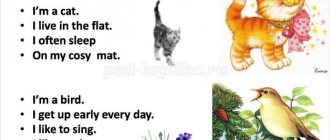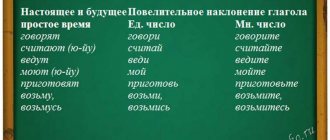Training video
Some things will seem stupid, but you can laugh and even act out on stage.
Russian tourists in America:
- Oh, look, look, a real old Indian! They say they are so smart. Well, everyone knows everything! Everyone knows about nature, animals! - Let's check, ask what the weather will be like in the coming days! Oh, Mr. Translator, please translate! - Excuse me, please. Can you tell us what the weather will be like during the next few days? - Oh, yes, rain is coming. Then there will be snow for a day or two, but then the sun will come again and the weather will be fine. It will be very warm. - Oh! What did he say, please translate! — He said that rain was coming. Then it will snow for a day or two, then the sun will come out again and the weather will be nice and warm. - Oh, yes! Knows everything! These Indians don’t even go to school, but they know more than we do. Ask how he knows all this. — Tell me, how do you know all that? — (the Indian takes out headphones with a player) I heard it over the radio!
Cat and mouse
- Hello! Do you know me? I am a little mouse. I am afraid of cats. Where is the cat? Where can I hide? - Hi! I am a cat. I would like to eat a mouse. Where is she? Uh! Pi-pi-pi! - Oh, it's my friend! - (Cat, grabbing the mouse) - You see, how nice to know foreign languages! Well, repeat it! How good it is to know foreign languages! — How nice to know foreign languages.
English lesson in Ukrainian school:
- Yvanenko! - I! — Du yu spyk english? - What? - Sit down. Patranko! - I! — Du yu spyk english? - What? - Sit! Tartarenko! - I am. Do you speak English? - What?
On exams
1) History exam in English.
Student pulls a ticket: Ivan Susanin! Oh my god! So what do I know? Yeah! Snow-snow. Forest-forest. He goes to answer. - Snow, snow, snow... Forest, forest, forest. In the middle of the forest, oh! In the middle of the forest stand Ivan Susanin. “Vanya, do you know the way to Moscow?” said German fascist reptile. “No,” said Ivan Susanin. Unclear? Well, in general, they ask him if he knows the way to Moscow. “Vanya, do you know the way to Moscow?” said German fascist reptile. No,” said Ivan Susanin. Snow, snow, snow… Forest, forest, forest. Shot, shot, shot. Ivan Susanin is the hero of the Soviet Union! Hura! Teacher: What? Ivan Susanin, hero of the Soviet Union?! (grabs his heart)
2) (Teacher to himself) - Only deuces! What would be an easier question to ask? Yeah! (to a student) - “What is the capital of Great Britain?” (silence). — What is the name of the capital of Great Britain? — Bucharest. - Wrong, London, London, fail, call the next one! (Two students) - Well, how? - Failure! - Why do they even ask? — When you come in, they ask you a question: what is the name of the capital of Great Britain? answer - London! - Oh, don’t forget! - Let me stick a piece of paper with an inscription on the sole. Lan-dan. Truncated? (the paper peels off) - (Teacher) - Come in, come in! My question is: “What is the capital of Great Britain?” - (The student looks at the sole and says) - “ADIDAS.”
Short
1) - Mom, say: fun. - For what? - So, say. - What is this anyway? - What difference does it make to you, just say: fun! “I won’t repeat stupid things that I don’t understand!” - So don’t force me to learn English!
2) - Well, what were your difficulties with your English in London? - I don’t have one, the British did.
3). Teacher to student: - Yes, my friend. You know the language well, but your pronunciation, excuse me, is obscene...
4). - Young woman! Why are you answering me in Chinese?! - Damn, I took the wrong textbook in the dark yesterday!
5) - Hello! How are you? - What an eccentric! Yes, I don’t steal anything...
- < Back
- Forward >
Back to school: jokes about school in English
A wonderful holiday is approaching - Day of Knowledge. In our country, September 1 is associated with the “line”, with schoolchildren dressed in “white top, black bottom”, with large bouquets of flowers, with white bows woven into their braids. In Great Britain and America there is no such holiday officially, because the school year in these countries begins at different times in all schools. Despite this, schoolchildren from all over the world encounter funny situations. And on the eve of Knowledge Day, we have collected for you jokes in English about school.
Today's joke parade will help you immerse yourself in the school atmosphere and remember what it's like to be a student. In order not to immediately rush headlong into the pool, we will start with the most enjoyable part of the school year - the holidays. Who among us did not love vacations and weekends on holidays? And which of us, after a long rest, wanted to go back to classes? I always wanted to relax more and more. But the hero of this joke could not have better noticed the main advantage that makes the summer holidays the most desirable and long-awaited part of the school year: rest is doubly pleasant if the rest is well-deserved.
Teacher: What is the purpose of having school? Student: Without school there wouldn't be a reason for holidays and summer vacation.
Teacher: What is the purpose of visiting school? Student: If there were no school, there would be no reason for weekends and holidays.
One can envy the optimism of this student, because it is so good to be able to look for the positive in everything. But it turns out that not only children are tired of the educational process. Teachers are also tired and look forward to summer just as much as their students. One of the teachers wittily noted the advantage of his work:
A teacher was asked to fill out a special questionnaire. One question said, “Give two reasons for entering the teaching profession.” The teacher wrote: “July and August.”
One day the teacher was asked to fill out a questionnaire. One of the questions read: “Give 2 reasons why you chose to become a teacher.” The teacher wrote: “July and August.”
Now that the summer holidays are coming to an end, we need to get involved in the educational process. It's no secret that children don't like to study. Surely you, too, were looking for a variety of reasons not to go to school. Especially in September, when the days are still nice and you want to run with friends along the street, and not sit in a stuffy classroom. At these moments, it seemed that the lesson lasted for an eternity, and only a cheerful joke could make the slowly flowing minutes go faster.
Physics Teacher: Isaac Newton was sitting under a tree when an apple fell on his head and he discovered gravity. Isn't that wonderful? Student: Yes sir, if he had been sitting in class looking at books like us, he wouldn't have discovered anything.
Physics teacher: One day Isaac Newton was sitting under a tree when suddenly an apple fell on his head. This is how he discovered gravity. Amazing, isn't it? Student: You are right, sir. If he constantly sat in class and looked at textbooks like we did, he definitely wouldn’t have discovered anything!
Agree, at first it is difficult to get used to the educational regime and the school daily routine. And the very idea of spending six lessons at a desk doesn’t seem at all attractive. And how good it is when the teacher does not lag behind the students and is also ready to take a break from theorems and axioms for a moment of humor. You definitely won’t get bored with the teacher from the following joke in class.
Teacher: Class, we will have only half a day of school this morning. Class: Hooray! Teacher: We will have the other half this afternoon.
Teacher: Class, we only have half of our classes this morning. Class: Hurray! Teacher: The second half will be after lunch.
Who doesn’t like to “dilute” a lesson with a funny joke? But it can be difficult for teachers to get students back to work. Children love to play around and are very happy to be distracted from the lesson. Therefore, the teacher must be a real sorcerer who can restore discipline in the class with one wave of a magic wand (or a magic pointer). Many more comparisons can be made that will colorfully describe a teacher’s ability to establish discipline. For example, Hendrik John Clark gave a successful and funny comparison:
A good teacher, like a good entertainer, first must hold his audience's attention. Then he can teach his lesson.
A good teacher is like an artist: first he must attract the attention of the public and only then teach something.
Hendrik John Clarke
Everyone knows that there are people with a technical and humanitarian mindset. And it often happens that it is difficult for humanities and technologists to understand each other. Already at school it is clear which of the children is inclined towards the exact sciences and which towards the humanities. For example, mathematics is difficult for people in the humanities. Mathematics is not an easy subject, and how good it was for those who understood it at school. The boy Tom, who will be discussed further, probably loves literature and the Russian language, and not algebra and geometry:
Mom: What did you do at school today? Tom: We did a guessing game. Mom: But I thought you were having a math exam. Tom: That's right!
Mom: What did you do at school today? Tom: We played a guessing game. Mom: But I thought you had a math exam. Tom: That's right!
Not everyone will agree with Tom's opinion. For example, Kate, the heroine of the next joke, does not like humanitarian subjects at all; she gravitates towards the exact sciences. History doesn't seem to be her favorite subject at school, and it's not easy for her to understand the "imprecise" science of the past. As any Englishman would say: History is not her cup of tea.
Kate: Why was school easier for cave people? Jim: Why? Kate: Because there was no history to study!
Kate: Why did cavemen have an easier time at school? Jim: Why? Kate: Because they didn't have history lessons!
Yes, everyone's mindset is different. But there is one feature that is common to most schoolchildren. And this feature was wittily noted by the American comedian Milton Berle. Surely you will also agree with Berl’s opinion when you remember how hard it is to wake up early in the morning and go to school with a briefcase full of textbooks.
The human brain is special. It starts working as soon as you get up and it doesn't stop until you get to school.
The human brain works in a special way. It starts working as soon as you wake up and stops as soon as you arrive at school.
Milton Berle
It’s especially difficult for first-graders. Children are very happy when they go to first grade for the first time, but it is difficult for them to get used to the school regime, to large and heavy briefcases, and finally to a new way of life. It’s not easy for first-graders for another reason: young children tend to take words literally. They have only recently begun to consciously learn about the world around them, and the teacher for them is one of the main sources of knowledge, so children take his words seriously. This gives rise to funny misunderstandings, for example, like Billy, whom we will meet below:
Father: Tell me how school went today. How do you like it? Billy: It's hard to like a place that's haunted, dad. Father: Haunted?! What do you mean? Billy: It's that new teacher of mine… she keeps talking about the school spirit.
Dad: Son, tell me how your day at school was. Did you like everything? Billy: No, I don't like this haunted house, Dad. Dad: Haunted?! What are you talking about? Billy: That's our new teacher, she always talks about some kind of school spirit.
As Ellie Carter said: “The older I got, the smarter my teachers became” (“The older I get, the smarter my teachers seem to me”). Unfortunately, as children, we don't always appreciate our wonderful teachers and don't understand how important it is to learn. But it's never too late to catch up. At our school you can learn English with experienced teachers.
We hope you smiled and remembered your teachers when you read English jokes about school. We congratulate you on Knowledge Day and want to wish you success in learning English!
Extracurricular event on the topic “English Humor”
Extracurricular event “English humour” Author: Anna Ivanovna Kopytina, foreign language teacher of the State Educational Institution of Secondary Professional Education Small Business College No. 4 of the city.
Moscow. Plan Presenters: 2 people (one of whom translates all the lines in the concert) 1. Sketch 1 “Apples and Oranges” 2 people 2 Song 1 “Yesterday” 1 person 3 Sketch 2 “In the classroom” 4-5 people 4. Sketch 3 “ English times" 4 people 5. Scene 4 "In a shoe store" 2 people. 6. Song 2 “Yellow submarine” 1 person Presenter1: Today we are going to show you some funny English stories and hope you'll like them.
The first story takes place at the shop. Let's listen to the customer and the shopkeeper's talk. Presenter2: Today we will show you some funny skits and we hope you like them. The first scene takes place in a store. Let's listen to the conversation between the buyer and the seller. Scene 1 “A men and a shopkeeper” (Conversation in the store) Characters: - buyer - seller Equipment: - counter - scales - bag of apples, bag of oranges The buyer approaches the counter, behind which there is a seller. On the counter are scales, a bag of apples, a bag of oranges. 1 customer How much do these apples cost? How much do these apples cost? 2 seller One shilling, sir One shilling, sir 3 buyer Give me a pound, please Weigh 1 pound, please 4 seller Here you are Here you are The seller hands the man apples The buyer takes the apples and looks at the oranges 5 buyer How much do these oranges cost ? How much do these oranges cost? 6 seller One shilling, sir One shilling, sir 7 buyer Can I exchange the apples for the oranges? The price is the same. Can I exchange apples for oranges? The price is the same 8 seller All right. Here are your oranges Okay. Here are your oranges The seller takes the apples and gives a bag of oranges The buyer takes a bag of apples 9 buyer Thank you Thank you And is about to leave 10 seller Sorry! The money! Sorry! Money! 11 buyer Money for what? Money for what? 12 seller The money for the oranges Money for oranges 13 buyer But I gave you the apples for the oranges But I gave you apples for the oranges 14 seller Well, then, the money for the apples Well, then money for apples 15 buyer But you still have your apples But you still have the apples The buyer pointed to the apples and left the store Full text of the material Extra-curricular activity on the topic “English Humor”, see the downloadable file
. The page contains a fragment.
| Author: Anna Ivanovna Kopytina → Felt 08/10/2011 8 16149 2542 | Comment |
Thank you for your mark. If you want your name to be known to the author, log in to the site as a user and click Thank you again. Your name will appear on this page.
Login | Registration
Have an opinion? Leave a comment





